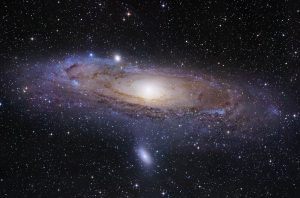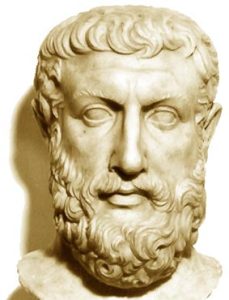Read part one here
In our last segment we introduced the two probing philosophers. Heraclitus and Parmenides are two of the most well known presocratic philosophers. They were both metaphysicians who took the stance that the universe can essentially can be reduced to one fundamental thing. However, as we mentioned, they had a severe disagreement about what that thing was.
Heraclitus took the stance that the universe was commanded by a divine reason or logos. The idea that the universe was always in a war of change and flux was the central tenant to this reasoning. Heraclitus believed that fire was the incarnation of a divine will that caused all change within reality and that the one undeniable law of the universe was that everything was always transforming into something else. Parmenides, had something of a disagreement on this point.
Parmenides
Parmenides took quite the opposite view of Heraclitus. Through deductive reasoning, Parmenides concluded that something that exists (it is) cannot also not exist (it is not). This would involve a logical contradiction. This thinking would lead Parmenides to conclude that a state of nothingness was impossible. A void in the universe or reality could not be. Parmenides then concluded that something could not have been created from nothing, the universe could not have sprang from an empty void. Additionally anything that exists could not logically go into a state of non existence. Therefore all that exists must have always existed in some form or another.
This idea of permanence means that something that is permanent can not change into something else without it ceasing to be permanent. Fundamental change, therefore, is impossible. All things are, they have existed and will always exist in one form or another. This idea of unchanging permanence lead Parmenides to conclude that there is an indivisible unity within the universe.
This idea can be rather difficult to process. It is hard to precisely grasp the concept that the universe is unchanging and that a state of nothingness is a logical impossibility. It would appear to be easy to disprove. If you ever met Parmenides, you might say to him “unicorns don’t exist (they exist as nothing). There, I proved you wrong”.
Parmenides would explain that the word “unicorn” does not refer to an actual object. Words always must hit a mark, so to speak. The word “unicorn” refers to a picture in your head, a concept. A word must have some basis of reality to it, the word “unicorn” is a representation of an idea, and therefore it exists.
Aristotle would later say that it is impossible for A to be B AND A is not B. Parmenides would say that we could not state that A is not B, period. Basically if you were tell Parmenides that an elephant could not be a butterfly (A is not B), then he would follow the same argument as before and explain that this elephant-butterfly was really a concept in your mind and therefore existed. The philosopher says himself.
“For it is the same thing that can be thought and that can be.”
And so to Parmenides, there is no change. There is no constantly shifting universe. There is a universe that is continuous, unchanging and eternal. This idea is difficult for us to come to terms with. After all, our senses tell us that things are changing all the time. Heraclitus attempted to counter Parmenides on that point exactly.
It is said that Parmenides took the stance that motion was impossible, as motion is a type of change, and Heraclitus sought to disprove him. Heraclitus took his arm, moved it about his face and essentially said ‘there, I disproved it’. Parmenides then says that just because an arm is in one location one moment and then a different location the next, it does not necessarily mean that the arm actually moved.
To Parmenides, knowledge gained through the senses was unreliable. Moreover, our empirical observations were actually deceptive. Just because we observe motion, doesn’t mean motion is a reality. The philosopher believed that to find truth, we must start from an epistemological ground zero, then rely only on our reason and logic to arrive at a worthy conclusion. And that conclusion, to Parmenides, was that all things are, there is no change, the universe is composed of an indivisible unity- “all is one”.
Check back soon for the final installment where we examine the implications of both philosophies.











3 comments
“…The idea that the universe was always in a war of change and flux was the central tenant to this reasoning.”
If so, who was the landlord?
“tenet” not “tenant”, please.
this article provided me with some really good ideas and knowledge about Heraclitus and Parmenides, Thank you!
I enjoyed reading the article and refreshed my view on these presocratic philosophers. Thank you
Trackbacks
Our apologies, you must be logged in to post a comment.